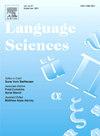I am criticizing you when I say “I am not criticizing you”: a prosodic-pragmatic exploration of the Chinese metapragmatic negation bùshì wǒ shuō nǐ
IF 1.1
2区 文学
Q2 EDUCATION & EDUCATIONAL RESEARCH
引用次数: 0
Abstract
The current study aims to explore both the prosodic pattern and the sociocultural motivations behind the linguistic form and prosodic features of the Chinese metapragmatic negation bùshì wǒ shuō nǐ “I am not criticizing you,” in order to understand how verbal language and nonverbal prosody interact in constructing the speakers’ pragmatic intent. The results show that the character shuō “to criticize” exhibits the highest F0, as well as the greatest intensity and duration ratio within the prosodic unit bùshì wǒ shuō nǐ, indicating that shuō serves as the focus of this prosodic unit. This finding suggests that speakers highlight the act of criticizing, even while using the negation marker bùshì “not” to deny any intent to criticize. These results shed light on how language users employ prosody to construct specific pragmatic meanings.
我说“我不批评你”是在批评你:汉语元语用否定的韵律语用探索bùshì wugshuu n_
本研究旨在探讨汉语元语用否定的语言形式和韵律特征背后的韵律模式和社会文化动机,以了解言语语言和非言语韵律如何在构建说话人的语用意图中相互作用。结果表明,“要批评”字在韵律单位bùshì内F0最高,强度和持续时间比最大,说明“要批评”字是这个韵律单位的重点。这一发现表明,说话者强调批评的行为,即使使用否定标记bùshì“不”来否认任何批评的意图。这些结果揭示了语言使用者如何使用韵律来构建特定的语用意义。
本文章由计算机程序翻译,如有差异,请以英文原文为准。
求助全文
约1分钟内获得全文
求助全文
来源期刊

Language Sciences
Multiple-
CiteScore
2.90
自引率
0.00%
发文量
38
期刊介绍:
Language Sciences is a forum for debate, conducted so as to be of interest to the widest possible audience, on conceptual and theoretical issues in the various branches of general linguistics. The journal is also concerned with bringing to linguists attention current thinking about language within disciplines other than linguistics itself; relevant contributions from anthropologists, philosophers, psychologists and sociologists, among others, will be warmly received. In addition, the Editor is particularly keen to encourage the submission of essays on topics in the history and philosophy of language studies, and review articles discussing the import of significant recent works on language and linguistics.
 求助内容:
求助内容: 应助结果提醒方式:
应助结果提醒方式:


